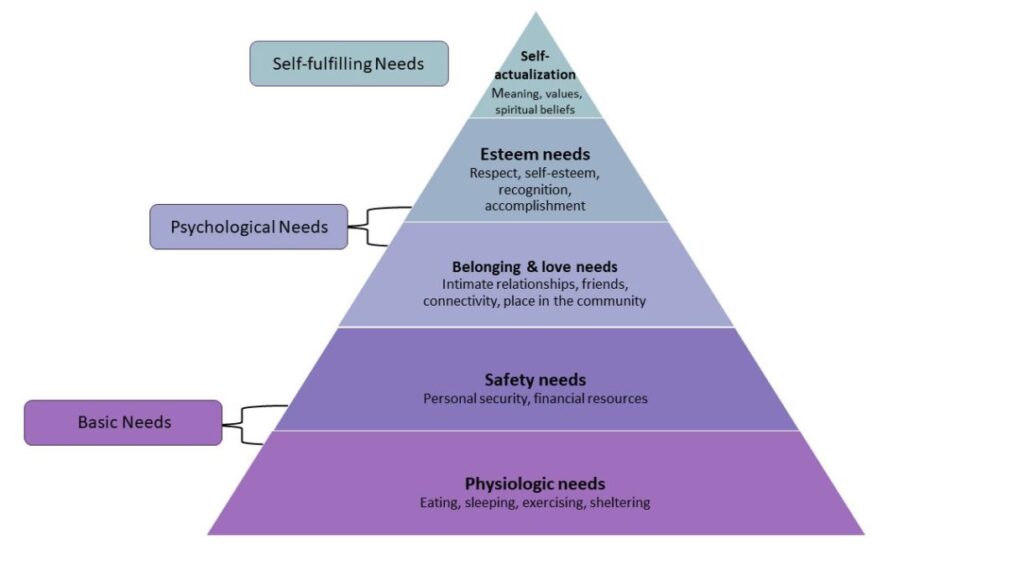Taking Care of You, The Caregiver

Why Is It Important for Caregivers to Take Care of Themselves?

In this section of the AIM website, we’ve discussed your important role as the caregiver in helping your loved one with melanoma meet his/her needs. And yet, what about you? We will now discuss your needs as the caregiver and strategies for meeting them using a pyramid of needs adapted to a caregiver, as shown above.
Addressing Your Basic Needs
Your most basic physiologic needs include eating, sleeping, and exercising. Are you being intentional about taking care of your health? Having your world turned upside down overnight and being forced into a journey you can’t avoid can be terribly hard on your body and your mind. Beyond that, you may be hesitant to focus on your own needs because of guilt or feeling overwhelmed. But you need to take care of yourself, or you won’t be able to take care of your loved one. You are in a battle, and you must be conditioned. It is really important, even if you don’t feel like it, to practice good health hygiene. This includes:
- Eating healthy foods
- Staying hydrated
- Getting enough sleep
- Being on guard for unhealthy habits such as smoking, drinking too much alcohol, or abusing prescription medications. It is easy to slip into unhealthy habits under the stress of caregiving
- Being proactive about addressing your own healthcare needs. See your primary care physician and get on a plan to address your own health needs. Some oncology practices will also offer checkups for the caregiver as well—it’s a good idea to ask early what the oncology practice can do to support you
As a caregiver, you may feel like things are out of control in terms of running the household, maintaining financial oversight, and dealing with your loved one’s illness.
Make sure you share information about what you are going through with people who are able to help you. People may be able to offer direct support or suggest resources. Mobilize your support network to get help with the everyday tasks of running the household or taking care of other tasks that can be delegated. Consider paid help, if needed.
Talk with your employer about what is happening (if applicable). S/he may be able to offer flexible working arrangements. Learn what you can about the Family and Medical Leave Act.
It’s so easy to get caught up in what they have going on.
You have to remember to take care of yourself, too.”
Celeste M., caregiver
Addressing Your Psychological Needs
In terms of loving and belonging needs, all humans are social creatures. We need to interact with others, including family, friends, and groups. It is important not to turn away from the contact and support from those who care, love, and help us. So make time. Some specific recommendations include:
- Enlist the support structure you share with your loved one in providing care. You can work together to take care of your loved one, but you can also help support each other
- Maintain the rituals and traditions you have with your loved one, as much as possible. By engaging in these activities, you can keep the relationship strong and perhaps maintain some sense of normalcy
- Plan social activities that build you up and that keep you connected with your own friends. If you put these items on the calendar at regular intervals, you can be assured that they happen and also have something to look forward to
- Consider caregiver support groups. These groups fulfill many of the same functions we described for patient support groups. For caregivers, they can provide a safe place to share emotional experiences without guilt. And hearing from those who have been there can be helpful. AIM at Melanoma’s Peer Connect program includes caregivers—learn more here
When we move on to your emotional needs, it’s helpful to remember that caregivers, like those who face melanoma, are often woefully unprepared for that battle. Caregivers may face depression, anxiety, frustration over a lack of information about the disease and treatment, and guilt for not attending to family during the treatments for the disease. Fear can be very real—fear of loss of control, inability to function, and of death. It is easy for caregivers to burn out and become overwhelmed with stress. Here are some important actions to consider in order to preserve your emotional health:
- Make time for activities that de-stress you—whether that’s exercising, gardening, or other activities that normally bring you joy. These activities are helpful, particularly when they force a break from the caregiving routine or involve a change of venue. You may need to force yourself to do them at first, but consider them investments in your health so that you can come back to caregiving with energy and compassion
- Look for signs that you are distressed (as previously described for the patient). You may want to have a close friend looking out for these signs or enlist the help of your healthcare provider to monitor for any issues
- Consider seeking professional help if things are not going well. Finding a trusted mental health professional can be key during this journey
- Find the humor in things—many studies have shown that laughter is therapeutic for people dealing with chronic challenges. If you and your loved one can find ways to laugh together, it can be de-stressing for both of you
“When my wife was in the middle of her treatment, she arranged for me to go to a Blues Traveler concert with my friends. Before she was sick, I would never go to something like that without her. I felt incredibly guilty about going, but she insisted, and I had a good time with my friends. It was a very loving thing for her to do.
So we both benefited.”
Gavin S., caregiver

